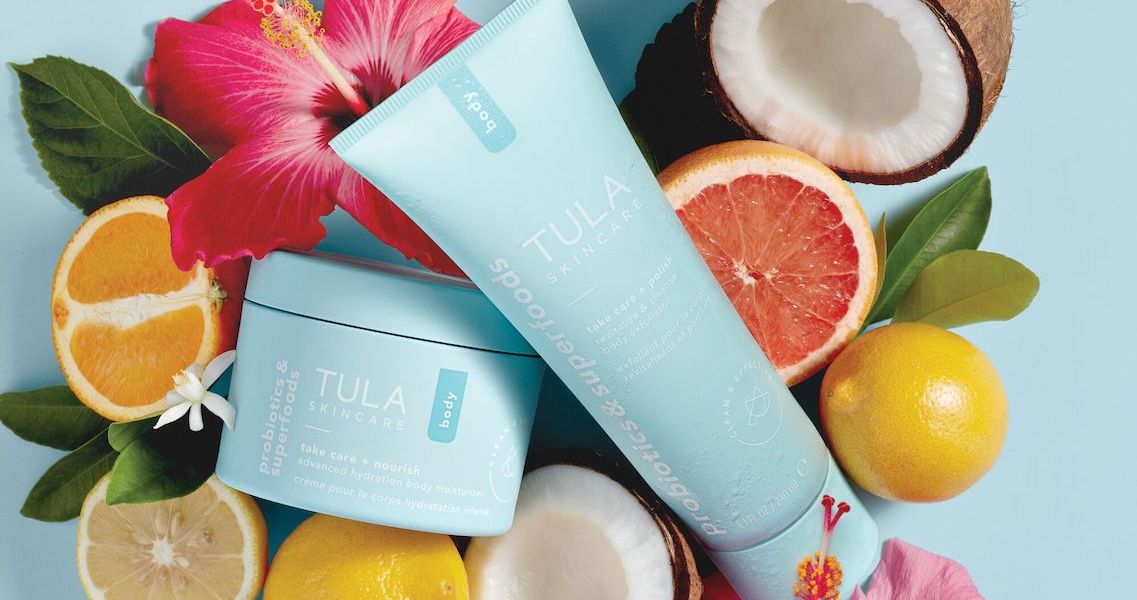This week, I examine retail exclusive relationships, spotlighting a new strategy between Tula and Ulta Beauty.
On Monday, Tula launched into body care through a creative exclusive deal with Ulta Beauty: It’s selling the products at the retailer, even before Tula DTC e-commerce.
Tula created a moisturizer and body exfoliator, called Take Care + Nourish Advanced Hydration Body Moisturizer and the Take Care + Polish Revitalize & Cleanse Body Exfoliator, respectively. They were available at Ulta.com on Monday and Ulta Beauty stores in late December, four weeks before Tula.com. Ulta Beauty has a one-year exclusive retail deal for the products, which will include Tula taking over the Ulta Beauty skin bar services area from Feb. 13 to March 5. Tula joined Ulta Beauty in 2018 with five products and has doubled its available assortment at the retailer every six months, with over 40 products currently available.
Savannah Sachs, CEO of Tula, declined to share what percentage of sales originate with Ulta Beauty, but said that Tula is the “fastest-growing” prestige skin-care brand at the retailer. Between 2018 and 2020, Tula sales grew by 300% year-over-year according to previous Glossy reporting from January. DTC e-commerce comprises just under 50% of its sales as of December.
The origin of Tula’s expansion to body care came about due to the industry-wide skin-care boom of 2020 and 2021, as well as a nudge by Ulta Beauty. According to Sachs, Ulta Beauty came to Tula to inform its executives of a whitespace in prestige body care. Specifically, the beauty industry saw that body-care sales increased 50% year-over-year, outpacing skin-care sales by 19%, according to Penny Coy, vp of merchandising at Ulta Beauty citing NPD data.
“[We thought] let’s do this together in a big way for this launch,” said Sachs. “We are seeing such an incredible resurgence of brick-and-mortar demand, especially this year. So, we said, ‘Why not lean in?’”
Despite proclamations of physical retail’s demise in 2020, omnichannel strategies encompassing physical retail, wholesale e-commerce and DTC brand e-commerce have proven just as important as ever. If the onset of Covid-19 informed businesses how vital e-commerce was, then the ensuing e-commerce supply chain constraints and demand for on-demand delivery have proven the importance of physical locales for distribution.
According to October data from real estate firm JLL, retail foot traffic has been steadily rebounding since the summer of 2020. Suburban shopping centers and malls experienced a 3.2% increase in foot traffic in October, compared to the same time in 2019. Meanwhile, October foot traffic at urban shopping centers and malls was still 16% below 2019 figures. Ulta Beauty, in particular, has over 1,300 national locations and another 50-plus shop-in-shops with Target, ensuring that it is filling the geographical holes in its physical distribution. According to foot traffic analytics firm Placer, Ulta Beauty saw a 10.33% increase in Black Friday foot traffic, compared to 2019.
The strength of omnichannel, even in the middle of a pandemic, has also bolstered retailers to rethink their exclusivity strategies. Walmart has notably crafted exclusive relationships with P&G, in the cases of the Nou Haircare brand and a six-piece collection with L’Oréal brand Garnier — both target Gen-Z shoppers. And the Olly vitamin brand has a longstanding deal with Target, granting the retailer’s physical and online channels six-month exclusivity alongside its own DTC e-commerce.
To support Tula’s body care launches, Sachs said the brand is rolling out marketing that’s focused on the products’ texture and alludes to the concept of self-care. Tula is working with 1,500 paid and unpaid influencers across TikTok and Instagram. According to previous Glossy reporting in July, one third of Tula’s revenue is derived from influencer affiliate marketing. Tula currently has 407,000 TikTok followers after launching on the platform in April 2020 and 422,000 Instagram followers. Coy said Ulta Beauty is featuring a dedicated table space at the front of its stores for Tula’s body care for three weeks. It will also spotlight the brand in its paid and unpaid social postings and marketing channels.
Coy said Ulta Beauty data shows that 65% of its customers believe there is a link between beauty and wellness, and 80% believe customers need to take better care of themselves. This, coupled with the growth of prestige body care sales and white space, informed Ulta Beauty of the potential for Tula body care.
“Within that [self-care data] is head-to-toe skin care,” Coy said. “How can we take deep dives into what subcategories are resonating? Where do [brands] have room to play further? We can drill down and pinpoint growth areas with all our brand partners… When we do an exclusive partner, many times, it’s because we’ve identified an open area.”
Ulta Beauty currently offers an It Cosmetics brush collection specially made for Ulta Beauty and select Peach & Lily products, among other exclusive product collections and brands.
“Beauty is inherently a touch, feel and trial category,” said Sachs. “There will always be an important role for in-person [shopping] in brick-and-mortar; the resurgence of [physical] retail this year has really proved the importance of having that balanced omnichannel strategy.”
Reading List
Inside our coverage:




